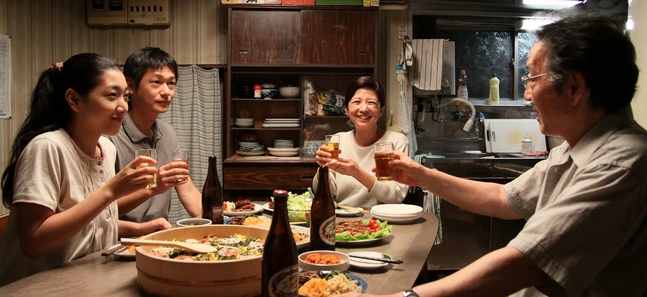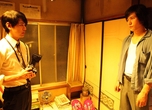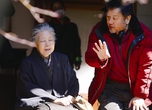Our Homeland (Kazoku no Kuni)
‘Dear Pyongyang’ director Yang Yonghi depicts a bittersweet family reunion

© 2011 Star Sands, Inc.
Posted: Fri Aug 03 2012
Director: Yang Yonghi
Starring: Sakura Ando, Arata Iura, Yang Ik-June
Time Out rating: 
Yang Yonghi's family are a fascinating bunch. A second generation Korean resident in Japan, the filmmaker was raised in Osaka by parents loyal to the DPRK, and saw all three of her brothers emigrate to this 'paradise on earth' as part of its repatriation program in the early 1970s. The effects of this on her kin have already provided fuel for two documentaries, 2005's Dear Pyongyang – following which she was banned from visiting North Korea altogether – and Sona, the Other Myself (2010). Our Homeland marks Yang's first foray into fiction, but it's still rooted in her own experiences – and is probably much richer as a result.
The endlessly watchable Sakura Ando (Love Exposure) stands in for the director herself, playing Rie, a 31-year-old teacher whose repatriated brother, Sonho (Arata Iura), returns to Japan on temporary leave to seek medical treatment for a brain tumour. But her excitement at being reunited with her older sibling after a 25-year separation is tainted by the fact that he's accompanied by a North Korean 'supervisor' (Breathless director-star Yang Ik-June), who spends his nights chain-smoking outside their house and coerces Sonho into attempting to recruit Rie as a spy.
Yang depicts the family reunions with a light tough, finding resonance in small gestures rather than overblown emotional set-pieces, while her background in documentary filmmaking allows her to make the most of an obviously limited budget. The world she depicts here is far removed from the grimness of other Korean-Japanese dramas like Yoichi Sai's Blood and Bones (2004): the family's pro-DPRK patriarch (Masane Tsukayama) is more an object of mirth than fear, and even Yang Ik-June's menacing stooge comes to seem more human as the film progresses.
Iura has the most challenging role here, as a man who's been forced to suppress much of what makes him human ('In that country, reason has no place,' he tells his sister at one point. 'You don't ask questions, you just follow.'). But it's Ando who shines brightest, managing to communicate more with her back turned to the camera than some of the support actors do in their more histrionic moments. It'd take a hard-hearted viewer not to be moved by the closing scenes of the film, whose emotional impact feels entirely earned.
Our Homeland opens at Theatre Shinjuku on August 4
Tweets
- About Us |
- Work for Time Out |
- Send us info |
- Advertising |
- Mobile edition |
- Terms & Conditions |
- Privacy policy |
- Contact Us
Copyright © 2014 Time Out Tokyo














Add your comment